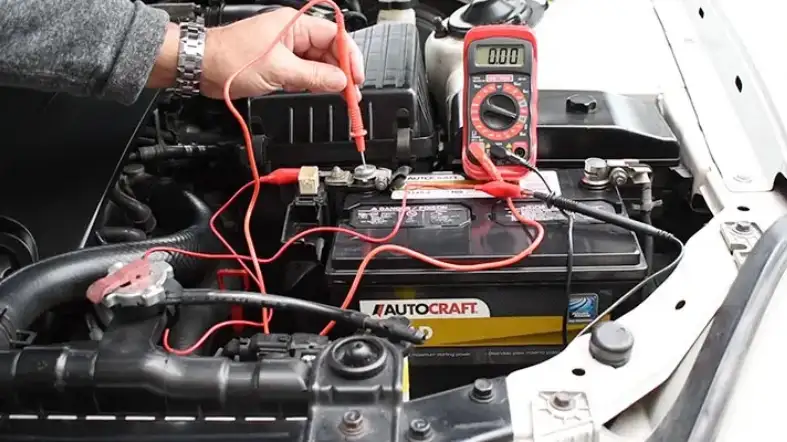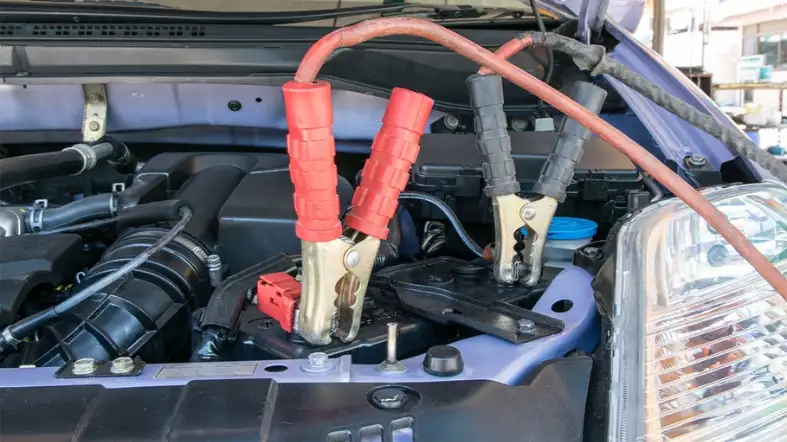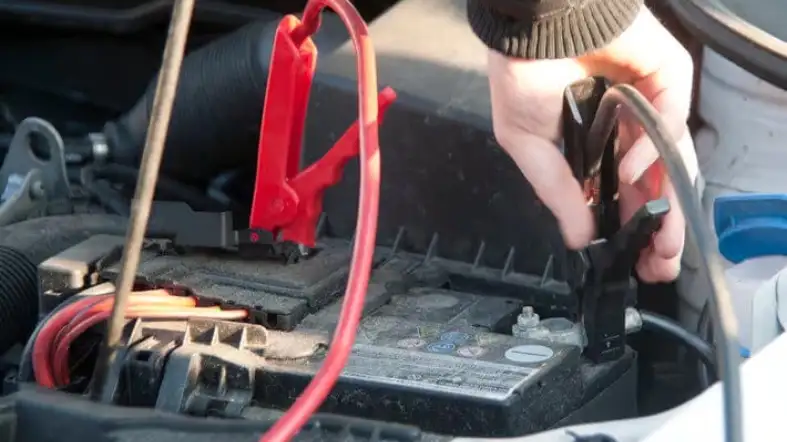Have you ever experienced the heart-stopping moment when you turn the key in your car’s ignition, and nothing happens?
As a car owner, it’s not uncommon to face issues like these, but what if we told you that a bad starter could be the culprit for draining your battery while you’re on the road?
A faulty starter can wreak havoc on your car’s electrical system, leaving you stranded on the side of the road or worse, in the middle of nowhere.
So, learn all about bad starters and how they can drain your car’s battery while driving.
Can a bad starter drain a battery while driving?
Yes, a bad starter can drain a battery while driving. When a starter motor fails, it can draw excessive amounts of power from the battery, even when the engine is running.

This can cause the battery to drain faster than it can be recharged by the alternator, leading to a dead battery.
In simple terms, a bad starter can cause your car’s battery to lose its charge while you’re driving, leaving you stranded.
If you suspect your starter is bad, it’s best to have it checked and replaced by a mechanic to avoid any potential issues on the road.
How can I know if my starter is draining my battery?
If you suspect that your car’s starter is draining your battery, there are a few signs and symptoms that you can look out for. Here are some points to consider:
1. Slow Cranking:
One way to determine if your starter is draining the battery is by observing the speed at which your car starts.
If it takes longer than usual for your car to start, this could be an indication of a draining starter.
The slower the cranking, the more power it draws from the battery.
It’s important to pay attention to any changes in the starting time, as this can help identify potential issues with the starter.
2. Clicking Noise:
Another sign of a failing starter is a clicking sound when you turn the key to start the car.
This clicking noise can occur when the starter doesn’t receive enough power from the battery to fully turn the engine over.
It’s important to note that if you hear a rapid clicking sound without the engine starting, it could indicate a weak battery rather than a problem with the starter.
In such cases, it’s recommended to check the battery charge before concluding that the starter is at fault.
3. Dim Lights:
Dim headlights or interior lights that appear to be less bright than usual can also be an indication of battery power loss.
While this symptom may not directly point to a draining starter, it suggests that the battery is not being adequately charged.
It’s worth noting that a failing alternator, which is responsible for charging the battery while the engine is running, can also cause dim lights.
Therefore, it’s important to consider both the starter and the alternator as potential culprits when experiencing dim lights.
4. Battery Drainage:
To check if your starter is draining the battery, you can use a multimeter to test the voltage of the battery.
With the car turned off, a reading of less than 12 volts could indicate that the battery is being drained by a faulty starter.
It’s important to ensure the battery is fully charged before conducting this test to obtain accurate results.
If the voltage reading is significantly lower than the expected range, it suggests that the starter is drawing excessive power from the battery, leading to drainage.
5. Testing the Starter:
If you suspect that your starter is draining the battery, it’s advisable to have it tested by professionals at an auto repair shop.
They can perform a load test on the starter to assess its power consumption and determine if it is drawing too much power from the battery.
The load test involves simulating the actual load the starter places on the battery during starting.
By measuring the voltage drop and evaluating the performance, experts can identify if the starter is functioning properly or if it requires repairs or replacement.
6. Other Possibilities:
While a draining starter can be a likely cause of battery drainage, it’s essential to consider other possibilities before concluding that the starter is solely responsible.
Battery drainage can also occur due to reasons such as leaving lights on or a parasitic drain from a faulty electrical component in the car.
Therefore, it’s crucial to rule out these possibilities before attributing the battery drainage solely to the starter.
Checking for any other potential causes ensures a thorough diagnosis and appropriate resolution of the issue.
What is draining the car battery when it is off?

There are several reasons why your car battery might be draining when the car is turned off. Here are some possible causes:
1. Parasitic drain:
Parasitic drain occurs when electrical components in your car continue to use power even when it is turned off.
Some examples of these components include the car’s clock, alarm system, or radio. Over time, the power drawn by these components can slowly drain the battery.
To minimize parasitic drain, you can try disconnecting or turning off any non-essential electrical devices when the car is not in use.
It’s also a good idea to have your car’s electrical system checked by a professional if you suspect excessive parasitic drain.
2. Faulty alternator:
The alternator plays a crucial role in recharging the car battery while the engine is running.
If the alternator is faulty or not functioning properly, it may not be able to fully recharge the battery. This can result in the battery draining faster when the car is turned off.
If you suspect a faulty alternator, it’s important to have it inspected and repaired by a qualified mechanic. They can check the alternator’s output and ensure it is providing the correct charge to the battery.
3. Loose or corroded battery connections:
Over time, the connections between the battery and the car’s electrical system can become loose or corroded.
This can create resistance in the electrical circuit, leading to a drain on the battery even when the car is turned off.
Regularly inspect the battery connections and terminals for any signs of corrosion or looseness.
If you notice any issues, clean the connections and tighten them properly. Applying a thin layer of petroleum jelly to the terminals can help prevent future corrosion.
4. Short circuits:
A short circuit occurs when there is an unintended connection between two parts of an electrical circuit.
In the context of a car battery, a short circuit can result in a continuous flow of electricity, even when the car is turned off.
Short circuits can be caused by damaged wiring, loose connections, or faulty electrical components.
If you suspect a short circuit, it’s important to have the electrical system inspected and repaired by a professional. They will be able to identify the source of the short circuit and resolve the issue.
5. Extreme temperatures:
Extreme temperatures, both hot and cold, can have a negative impact on your car’s battery.
In cold temperatures, the battery’s chemical reactions slow down, making it harder for the battery to hold a charge.
This can lead to a drained battery, especially if the car is left unused for an extended period in cold weather.
On the other hand, hot temperatures can cause the battery’s fluid to evaporate, potentially damaging the internal components and shortening its lifespan.
It’s important to note that high heat can also accelerate the chemical reactions within the battery, causing it to degrade more quickly.
How to prevent a bad starter from draining your car battery?

A bad starter can be a real headache, especially if it starts to drain your car battery. Here are some things you can do to prevent this from happening:
1. Keep your battery in good condition:
A healthy battery can withstand some extra strain from a bad starter, so it’s important to keep it charged and in good condition.
Regularly check the battery terminals for corrosion and make sure the battery is securely fastened in place.
2. Don’t crank the engine for too long:
If you have a bad starter, it’s important not to crank the engine for too long. This can put extra strain on the battery and cause it to drain faster.
Instead, try starting the car in short bursts, allowing the starter to cool down between attempts.
3. Use jumper cables sparingly:
Jump-starting your car can be a quick fix for a dead battery, but it’s important not to rely on jumper cables too often.
Overusing them can damage your battery and electrical system over time.
4. Replace the starter:
If your starter is consistently causing problems, it may be time to replace it.
A new starter can be expensive, but it’s a necessary investment to keep your car running smoothly and prevent battery drain.
5. Get your car checked regularly:
Regular maintenance and check-ups can help identify potential problems before they become major issues.
Take your car to a trusted mechanic for regular tune-ups and inspections to ensure that your starter and battery are functioning properly.
FAQs
Q. How Long Could My Bad Starter Last?
A: The lifespan of a bad starter can vary depending on various factors, such as the severity of the issue, the make and model of the vehicle, and the driving conditions.
In some cases, a bad starter can last for a few weeks or months, while in others, it may fail completely and need to be replaced.
Q. Can A Bad Alternator Also Drain My Car Battery?
A: Yes, a bad alternator can also cause your car battery to drain while you’re driving.
The alternator is responsible for charging the battery while the engine is running, so if it’s not working properly, your battery may not be getting the charge it needs to stay fully charged.
Q. What Should I Do If My Car Battery Keeps Getting Drained While I’m Driving?
A: If you’re experiencing repeated battery drain while driving, it’s important to have your vehicle inspected by a professional mechanic.
They can diagnose the root cause of the problem and recommend the necessary repairs to ensure that your car is safe and reliable on the road.
Q. Can I Jumpstart My Car If The Battery Has Been Drained By A Bad Starter Or Alternator?
A: Yes, you can jumpstart your car if the battery has been drained by a bad starter or alternator, but keep in mind that this is only a temporary fix.
You’ll need to have the underlying issue addressed by a mechanic in order to prevent the battery from draining again in the future.
Conclusion
A bad starter can indeed drain your car battery while you’re driving.
When your starter malfunctions, it can cause a power drain on your battery, which can ultimately lead to a dead battery.
If you notice any signs of a bad starter, such as a slow or hesitant start, strange noises, or a clicking sound, it’s important to get it checked out by a professional mechanic as soon as possible to avoid any potential issues while driving.
Regular maintenance and inspections of your car’s starter system can help prevent any unexpected problems on the road, so make sure to stay on top of it to keep your car running smoothly.
